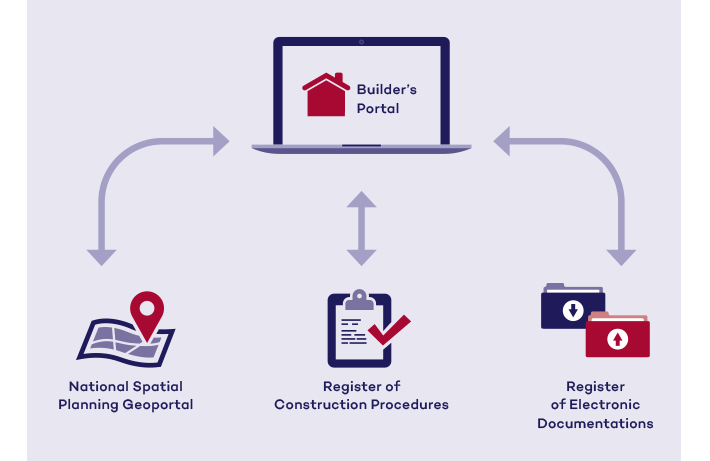The new Building Code eventually allows for the digitisation of building proceedings. The aim is to develop a digital system that will facilitate building proceedings so that there is no longer a need to go around to offices as everything can be handled electronically from anywhere. Are we finally in for a revolution? Will we no longer have to run around to offices with a handful of papersand collect stamps?
If you want to engage in a construction project, you must get up to an amazing 48 stamps today. You will have to go round to offices and do endless paperwork. The new Building Code could finally bring change, as it envisages not only simplification but also the complete digitisation of building proceedings. Until now, the builder had to submit an application accompanied by dozens of annexes and certificates. Now, submitting only one application should suffice, all to be done remotely online.
Electronic services in the context of the new Building Code will be provided by the state building administration via new information systems. These include namely the Builder’s Portal; the National Spatial Planning Geoportal; the Register of Construction Procedures; the Electronic Documentation Register and the Information System for Identification Numbers of Construction Projects, among others.
Under the new Building Code, these systems will be administered by the new Supreme Building Authority, which should start operating de jure from 1 January 2022 and will become the central administrative authority not only in matters of spatial planning, but also in matters of building regulations and expropriation. Some of the systems are already inplace today, so they will gradually come under the administration of the Supreme Building Authority, and some will only come into existence with the entry into force of the new Building Code.
From 2022 onwards, they should be gradually implemented, especially in technical and architectural terms. However, the most complex task will ultimately be the responsibility of the Supreme Building Authority – uploading actual data on the respective information systems. Afully-fledged electronic administrative file should then be available, replacing the paper file. Along with it, the possibility of electronic filing of documents in the information system, including project documentation and other annexes, will be introduced. We should expect full use of these information systems when the new Building Code comes into full effect, i.e. from July 2023.
The Builder’s Portal – the basis of digitisation
The Builder’s Portal is the cornerstone of the entire digital system. It will be the main working environment for individual sand legal entities, via which they will have access to other information systems of the state building administration. The portal should use interactive forms to interlink systems and communication with building authorities, planning authorities and other involved bodies.
The Builder’s Portal will enable the acceleration and streamlining of all construction-related processes. It will be possible to apply electronically for all decisions and other measures via a single portal accessible via the internet.
People will be able to digitally transact with the building authority via this system, including linking to electronic documents in information systems. And the system will also bring the possibility of remote access for all authorised persons, who will be able to inspect the files of the building authorities and other digital repositories according to the scope of their authorisation.
The Builder’s Portal should enable the acceleration and streamlining of all individual activities and processes in building matters. All aspects such as environment, sanitation, road connection, fire brigade, etc. will be considered by the authority within one procedure and it will be possible to apply electronically for all decisions and other measures via one portal accessible via the internet.
Linked to the Builder’s Portal is a separate Information System for Identification Numbers of Construction Projects that assigns a unique number to each construction project. This will allow construction projects in the building administration information systems to be identified and matched with all the data and documents kept. The identification number will also serve for internal and statistical purposes of the public administration.
National Spatial Planning Geoportal
The information system of the National Spatial Planning Geoportal will provide access to data and information from spatial planning activities in electronic form and should serve in particular for publishing results of spatial planning activities or for monitoring the process of spatial planning documentation. At the same time, spatial data that directly or indirectly refer to a specific location or geographical area, the use of which is considered to be in line with environmental protection requirements, will be accessible there. The Supreme Building Authority will be the administrator and operator of the Spatial Planning Geoportal in this case as well.
Register of Construction Procedures
The Register of Construction Procedures is intended to be an information system allowing the storage of information relating to pending proceedings under the Building Code. Thus, a record of all the participants’ actions, including decisions of the building authority or the relevant authority involved, will be available in one place. Making information and documents available remotely should simplify procedures for applicants and make it possible to obtain information on the status of the proceedings without there being any need to physically consult the paper file.
Electronic Documentation Register
The Electronic Documentation Register system will be a data repository for project documentation in electronic form. It will be possible to upload documentation easily via the Builder’s Portal in PDF and machine-readable formats.
Access to the data and electronic documents in the Register of Construction Procedures and in the Electronic Documentation Register of will be limited to those who have the right to consult the file under the Code of Administrative Procedure. The principle of administrative procedures being non-public must be respected. The data will thus be accessible only to the parties to the proceedings, their representatives and other persons who can demonstrate a legal interest. A person authorised to access the records will have the right to remote access, including machine information search and the making of extracts and copies.

Digitisation of construction law outside the Building Code
Moreover, we can also think about the digitisation of processes outside the framework of the Building Act. For example, thegeneral binding legislation allowed for a fully electronic construction diary. For construction projects implemented under public contracts in the above-limit regime, the keeping of a digital construction diary has been mandatory since 1 January 2021. The new Building Code has not changed anything in this respect, but it has not made the keeping of a fully digital construction diary any easier either.
Therefore, all entries in the construction diary can still be made electronically and all authorised persons making entries must be able to sign the diary electronically, by means of an electronic signature in the vast majority of cases.
Unfortunately, in rare cases, it is necessary to add an additional step to the recording process, for example, in the case of so-called authorised persons (e.g. design engineers, construction managers or construction supervisors) who are required to affix their handwritten signature and authorisation stamp with the state insignia to select documents when carrying out their authorised activity. Czech law or applications known on the Czech market do not yet allow their actions to be carried out exclusively electronically. Therefore, in these cases, digital construction diaries need to be used along with authorised conversion for the time being. However, the completion of digitalisation in this respect is already on the way, at least for authorised persons from 1 July 2023.






